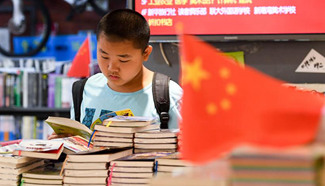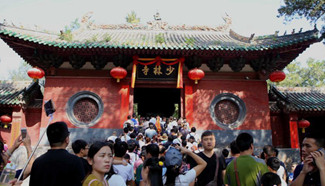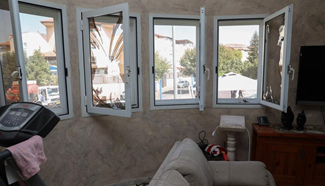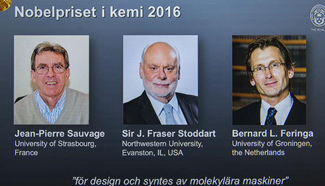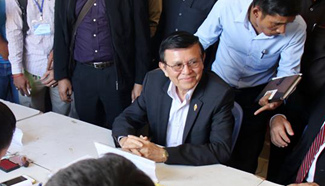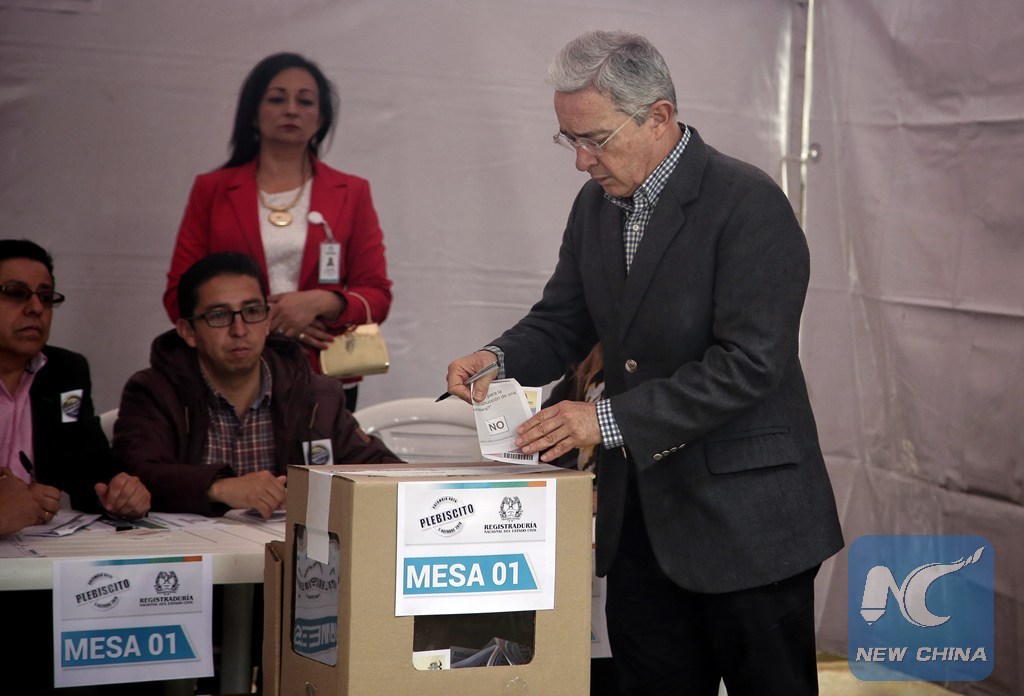
Former Colombian president and Senator Alvaro Uribe (R) casts his vote in the plebiscite for peace in Bogota, capital of Colombia, on Oct. 2, 2016. (Xinhua/Luisa Gonzalez/COLPRENSA)
by Sylvia B. Zarate
BOGOTA, Oct. 4 (Xinhua) -- Colombia's former president and current senator Alvaro Uribe has shown himself to still be a popular leader capable of gathering large-scale support for his arguments against a peace agreement with the rebels.
Under his influence, voters rejected the deal with the Revolutionary Armed Forces of Colombia (FARC) in Sunday's referendum by 50.21 percent to 49.78 percent. Colombia's President Juan Manuel Santos is scheduled to meet Uribe to discuss how to take the peace process forward.
Uribe's party, the Democratic Center, said that the agreement to end 52 years of civil war was too lenient by providing amnesty to FARC members and guaranteeing them seats in Congress.
During his presidency (2002-2010), Uribe, whose father was killed by the FARC during a kidnapping attempt in 1983, took a tough line on guerrilla groups.
The former president tried to convince over 6.4 million Colombian voters of the potential consequences of letting the FARC gain access to politics.
Furthermore, his party has benefited from the support of religious leaders and right-wing politicians, who helped get the message out.
During one large match in the city of Cartagena, priest Miguel Arrazola denounced the peace process for being supported by the governments of Cuba and Venezuela.
"We are delivering the country to the devil," said Arrazola during the march on Sept. 26, the same day that Santos and FARC leader Timoleon Jimenez signed the peace agreement.
Another sector of society that Uribe managed to conquer included the families of armed forces. To them, the former president showed his indignation that the agreement could place soldiers at the same level as FARC members during the peace process.
"We do not agree that the Havana agreement (about transitional justice) allows kidnappers, drug traffickers, and rapists ... to not spend a day in prison and also gives them political eligibility," Uribe said at a rally in Medellin in June.
The No campaign promoted by Uribe mostly triumphed in the central areas of the country, except in Bogota and Boyaca. In areas that have suffered the most from the conflict, the Yes campaign dominated the results, while those living in cities far away from the conflict voted against the agreement.
Despite Uribe's victory, the very low turnout of the referendum at 37.49 percent shows the broad indifference of the Colombian electorate.
Moreover, the fact that the peace agreement was rejected by a slim margin does not give Uribe much room to broadly ask for a renegotiation of the deal.
However, this has not stopped Uribe from saying that, to be acceptable, the deal must include jail terms for those responsible for the worst crimes. Analysts think he might seek to stall negotiations until the next presidential elections in 2018, where he is likely to stand.
On Tuesday, in an interview with Colombia's BLU Radio, Uribe said he wanted Santos to keep negotiating with the FARC.
"I would prefer ... that there be some quick corrections to reorient certain policies," said Uribe. "We are respectful of the competence (of the government)."
Related:
Spotlight: Peace process in Colombia halted
BOGOTA, Oct. 3 (Xinhua) -- Six days after President Juan Manuel Santos and Revolutionary Armed Forces of Colombia (FARC) leader Timoleon Jimenez signed a peace agreement to end 52 years of a civil war, Colombia's peace process has come to a halt. Full story
Colombia's Santos, Uribe to meet to discuss FARC peace process
BOGOTA, Oct. 4 (Xinhua) -- Colombia's President Juan Manuel Santos will meet former president and senator Alvaro Uribe on Wednesday morning to discuss how to take the peace process with the FARC forward, after voters rejected the current peace agreement in Sunday's referendum. Full story
Spotlight: Colombia's peace process faces uncertainty as citizens reject FARC peace deal
BOGOTA, Oct. 2 (Xinhua) -- The future of the peace process in Colombia is now uncertain as the No camp took a razor-thin lead Sunday in a national vote on whether to accept the agreement between the government and the Revolutionary Armed Forces of Colombia (FARC). Full story



